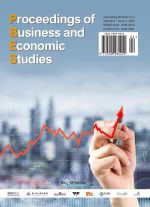Abstract
This study examines the mechanisms through which China’s virtual economy impacts the relationship between money supply and inflation. The study constructs a VAR model and conducts Granger causality tests using data collected from 2010 to 2025. The analysis comparatively investigates the differential effects of money supply changes on key virtual economy sectors, that specifically equity markets and real estate markets. This study reveals a bidirectional causal relationship between China’s stock market and M1 money supply, exerting a significant influence on monetary structure. The real estate market demonstrates a pronounced diverting effect on M2, which indirectly impacts the CPI. Virtual economy attenuates the positive correlation between money supply and inflation established by the Fisher Effect, forming a complex mechanism characterized by asymmetric responses under specific conditions.
References
Montes G, Tiberto B, 2012, Macroeconomic Environment, Country Risk and Stock Market Performance: Evidence for Brazil. Economic Modelling, 29(5): 1666–1678.
Aastveit K, Furlanetto, F, Loria, F, 2017, Has the Fed Responded to House and Stock Prices? A Time-Varying Analysis. Review of Economics and Statistics, 105(5), 1314–1324.
Zhang L, 2020, Financial Structure, Asset Prices and Inflation in China. Journal of Central University of Finance and Economics, 2020(8): 26–34.
Duan Z, 2007, The Relationship Between Real Estate Prices, Inflation, and Output: Theoretical Analysis and Empirical Verification Based on Chinese Data. Quantitative Economics and Technical Economic Research, 2007(12): 127–139.
Zhang W, Jing W, Xu N, 2021, Time-Varying Causes of the Divergence Between Money Supply and Inflation. Journal of Central University of Finance and Economics, (June): 77–89.
He Q, Zou H, 2015, Credit Expansion, Virtual Economy, Resource Allocation, and Economic Growth. Economic Research, 50(4): 36–49.
Feng F, 2009, Nominal Interest Rate and Inflation: A Re-examination of the ‘Fisher Effect’ in China—An Analysis Using Threshold Regression Models. Quantity Economics & Technical Economic Research, 2009(1): 89–98.
He W, Wang C, 2008, Money Supply, Virtual Economy, and Inflation: A Reassessment of the Influence of Money Supply and Virtual Economy on Inflationary Factors. Journal of Finance and Economics, 10: 2–3.
Wang J, Wu Y, 2014, The Impact of Stock Prices on Money Demand: An Empirical Study Based on China’s M1 Data. Economic Issues, 2014(8): 65–70.
Ma F, Tian Y, 2010, The Impact of Money Supply on Inflation in a Virtual Economy: An Empirical Analysis Based on the Chinese Economy. Journal of Capital University of Economics and Business, 2010(6): 32–33.
